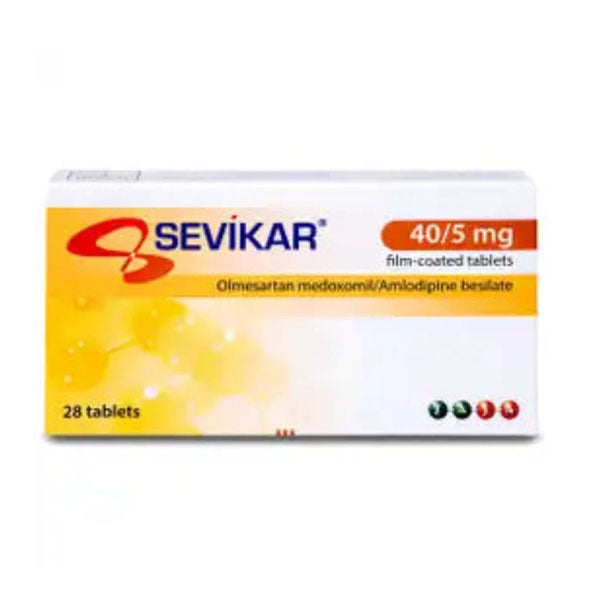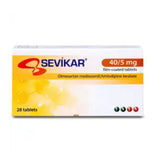Sevikar 40/5 mg 28 tablets:
Olmesartan medoxomil/amlodipine 40 mg/5 mg film-coated tablets
What are the uses of Olmesartan/Amlodipine?
- Olmesartan/amlodipine contains two substances called olmesartan medoxomil and amlodipine besylate. These two substances help control high blood pressure.
- Olmesartan medoxomil belongs to a group of medicines called 'angiotensin II receptor antagonists'.
- Amlodipine belongs to a group of substances called 'calcium channel blockers'.
How to take olmesartan/amlodipine:
- Always take this medicine exactly as your doctor or pharmacist has told you. Check with your doctor or pharmacist if you are not sure.
- The recommended dose of olmesartan/amlodipine is one tablet per day.
- The tablets can be taken with or without food. Swallow the tablet with some liquid (such as a glass of water). The tablet should not be chewed. Do not take it with grapefruit juice.
- If possible, take your daily dose at the same time each day, eg breakfast time.
Do not take olmesartan/amlodipine:
- If you are allergic to olmesartan medoxomil, amlodipine, special combination calcium channel blockers, dihydropyridine, or any of the other ingredients of this medication.
- If you have diabetes or kidney dysfunction and are being treated with a blood pressure lowering medicine containing aliskiren.
- If you have serious liver problems, if the secretion of bile is poor or if there is a blockage in the drainage of bile from the gallbladder or if you have any jaundice.
- If you suffer from severe low blood pressure.
- If you experience a lack of blood flow to your tissues with symptoms such as low blood pressure, low pulse, and rapid heartbeat.
- If blood flow to your heart is obstructed
- If you experience a decrease in cardiac output (leading to shortness of breath or peripheral swelling) after a heart attack.
Warnings and precautions:
Tell your doctor if you have any of the following health problems:
- Kidney problems or kidney transplant.
- Liver disease.
- Heart failure or problems with the heart valves or heart muscle.
- Severe vomiting, diarrhoea, treatment with high doses of 'water tablets' or if you are on a low-salt diet.
- Increased levels of potassium in the blood.
- Problems with the adrenal glands.
Possible side effects:
- Dizziness. Headache; swelling in the ankles, feet, legs, hands, or arms; exhaustion.
- lack of energy; tingling or numbness in the hands or feet; vertigo; Heartbeat awareness. Rapid heartbeat.
- Some changes in blood test results are also observed and include the following: increased as well as decreased blood potassium levels, increased blood creatinine levels, increased uric acid levels, increased liver and muscle function tests, increased fat levels, and increased blood urea.
- Bronchitis; sore throat; Runny or stuffy nose. cough; Stomach ache; Stomach flu; Diarrhea; Indigestion; nausea; Pain in the joints or bones. Back ache; Blood in urine. Urinary tract infection. Source; With flu-like symptoms; pain.
- Low numbers of types of blood cells known as platelets and angina (chest pain or discomfort). Itchy; Skin eruption. Allergic rash Skin rash with hives. Swelling of the face. muscle pain; Feeling unwell.
- Swelling of the face, mouth, and/or throat (voice box). Acute renal failure and kidney failure. Idleness.
- Edema (fluid retention).
- Stomach ache; nausea; Swelling of the ankle, feeling drowsy; Redness and a feeling of warmth in the face, visual disturbances (including double vision and blurred vision), awareness of heartbeat, diarrhea, constipation, indigestion, cramps, weakness, difficulty breathing.
-
Difficulty sleeping. Sleep disorders; Mood changes including feelings of anxiety. depression; irritability; With shudder; Taste changes; fainting; ringing in the ears; Hair loss; increased need to urinate (micturition); Breast enlargement in men. Weight gain or loss.
-
Confusion.
Other medicines and olmesartan/amlodipine:
Tell your doctor or pharmacist if you are taking, have recently taken or might take any of the following medicines for:
- blood pressure.
- depression.
- pain.
- Blood fats.
- AIDS.
- Fungal infections.
- Heart problems.
- Bacterial infections.
- Disturbances in body temperature.
- Transplanted organ.


